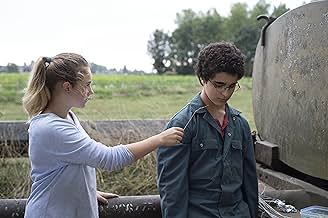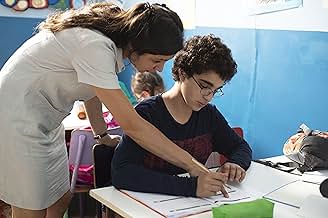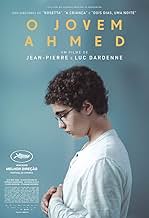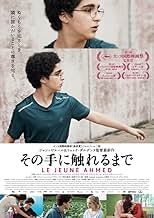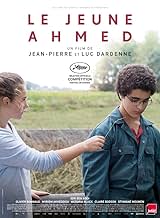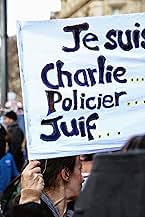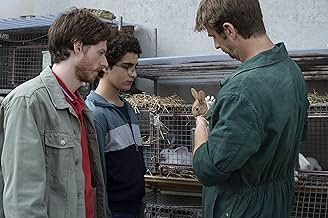Le jeune Ahmed
- 2019
- 1 Std. 25 Min.
IMDb-BEWERTUNG
6,6/10
4928
IHRE BEWERTUNG
Nachdem er sich eine extremistische Interpretation des Korans zu eigen gemacht hat, will ein belgischer Teenager seinen Lehrer umbringen.Nachdem er sich eine extremistische Interpretation des Korans zu eigen gemacht hat, will ein belgischer Teenager seinen Lehrer umbringen.Nachdem er sich eine extremistische Interpretation des Korans zu eigen gemacht hat, will ein belgischer Teenager seinen Lehrer umbringen.
- Regie
- Drehbuch
- Hauptbesetzung
- Auszeichnungen
- 5 Gewinne & 12 Nominierungen insgesamt
Eva Zingaro
- Psychologue du centre
- (as Eva Zingaro-Meyer)
Empfohlene Bewertungen
At first I want to establish a few things, first that I'm a Muslim person who live in an Islamic country which is Egypt, the second is that I like The Dardennes' cinematic language and I liked (Deux jours, une nuit) so much.
There is no actual plot, the movie is just going nowhere and doesn't follow the three acts structure. The movie is a character study movie but our main character is such a flat, unrealistic and caricature character. How can a kid be like that? How can a kid have this kind of thoughts? How can a kid have this cruelty? How can a kid have this insist on doing this kind of a violent act? It was a flat character who didn't change too much from the beginning to the end. The movie represents the idea of accepting people even if they tried to hurt you, but why did the Dardenne brothers put Muslims as the bad guys? Actually why are we treated as the bad guys from everyone? Bin-Laden? come on look at Hitler or Stallin. Whatever we are the stereotype of violence now so why do I whine.
The Dardenne brothers still have their cinematic tools like the long takes, shaky camera and not using a music. And like I said I liked it in (Deux jours, une nuit) But in this movie actually these tools made the movie slow paced and boring most of the time.
At the end I didn't like the movie at all, It wasn't entertaining and its ideas were biased.
There is no actual plot, the movie is just going nowhere and doesn't follow the three acts structure. The movie is a character study movie but our main character is such a flat, unrealistic and caricature character. How can a kid be like that? How can a kid have this kind of thoughts? How can a kid have this cruelty? How can a kid have this insist on doing this kind of a violent act? It was a flat character who didn't change too much from the beginning to the end. The movie represents the idea of accepting people even if they tried to hurt you, but why did the Dardenne brothers put Muslims as the bad guys? Actually why are we treated as the bad guys from everyone? Bin-Laden? come on look at Hitler or Stallin. Whatever we are the stereotype of violence now so why do I whine.
The Dardenne brothers still have their cinematic tools like the long takes, shaky camera and not using a music. And like I said I liked it in (Deux jours, une nuit) But in this movie actually these tools made the movie slow paced and boring most of the time.
At the end I didn't like the movie at all, It wasn't entertaining and its ideas were biased.
Le Jeune Ahmed is not just another movie about radicalism, misogyny, or going down the wrong path. As in life, the reality is far more complex and the Dardenne brothers understand that deeply. They are masters at portraying subtle, everyday life; not overly dramatic, but rich in nuance and emotional truth.
It's no different here. The film begins with the deeply unsettling unraveling of a boy who believes he must hate his teacher. Brainwashed by his imam, he follows a path of destruction. Yet when he's caught and placed under the care of the state, a shift begins. Removed from his known environment, he's sent to work on a farm, where he meets a girl his own age. What begins as a typical "girl-meets-boy" situation takes an unexpected turn: unlike the usual teenage story, Ahmed is torn between the hate he was conditioned into, and the unfamiliar feelings of mutual attraction and connection.
Le Jeune Ahmed is far too subtle and socially engaged to become a simplistic tale of good versus evil. Life isn't simple and this film doesn't pretend it is. This is no Hollywood redemption arc. The Dardenne brothers deliver a beautifully restrained yet emotionally charged drama that lingers long after it ends.
It's no different here. The film begins with the deeply unsettling unraveling of a boy who believes he must hate his teacher. Brainwashed by his imam, he follows a path of destruction. Yet when he's caught and placed under the care of the state, a shift begins. Removed from his known environment, he's sent to work on a farm, where he meets a girl his own age. What begins as a typical "girl-meets-boy" situation takes an unexpected turn: unlike the usual teenage story, Ahmed is torn between the hate he was conditioned into, and the unfamiliar feelings of mutual attraction and connection.
Le Jeune Ahmed is far too subtle and socially engaged to become a simplistic tale of good versus evil. Life isn't simple and this film doesn't pretend it is. This is no Hollywood redemption arc. The Dardenne brothers deliver a beautifully restrained yet emotionally charged drama that lingers long after it ends.
YOUNG AHMED
The justifiably renowned Dardenne Brothers won the Cannes Directing prize for YOUNG AHMED, but, it isn't one of their stronger films, despite some interesting thematic elements. Ahmed (Idir Ben Addi) is a teenage Muslim in Belgium who, under the influence of a radical Imam (Othmane Moumen ) becomes increasingly strict in his religious practices putting him at odds with the more open ways of his school and even his own family (neither his mother (Claire Bodson) or sister wear hijabs). When Ahmed puts his radical thoughts into action he is placed in a youth detention/rehabilitation center. It is there that the bulk of the brief 84 minute picture is set, and where Ahmed continues to struggle finding his way between his ultra-conservative and strict principles, and adapting to the modern world. Much of the criticism of the Dardennes has been that it doesn't provide enough answers about Ahmed. Throughout their distinguished careers, the brothers have never been ones to provide easy conclusions, they are most adept at posing questions and challenging the viewer. What keeps YOUNG AHMED from fully succeeding is that in their best work (ROSETTA, L'ENFANT) the directing team finds a way to provide a strong dramatic narrative to pose their queries. Here, Ahmed's tale, while well documented, fails to fully engage. The movie has moments, but, they are fleetingly effective.
The justifiably renowned Dardenne Brothers won the Cannes Directing prize for YOUNG AHMED, but, it isn't one of their stronger films, despite some interesting thematic elements. Ahmed (Idir Ben Addi) is a teenage Muslim in Belgium who, under the influence of a radical Imam (Othmane Moumen ) becomes increasingly strict in his religious practices putting him at odds with the more open ways of his school and even his own family (neither his mother (Claire Bodson) or sister wear hijabs). When Ahmed puts his radical thoughts into action he is placed in a youth detention/rehabilitation center. It is there that the bulk of the brief 84 minute picture is set, and where Ahmed continues to struggle finding his way between his ultra-conservative and strict principles, and adapting to the modern world. Much of the criticism of the Dardennes has been that it doesn't provide enough answers about Ahmed. Throughout their distinguished careers, the brothers have never been ones to provide easy conclusions, they are most adept at posing questions and challenging the viewer. What keeps YOUNG AHMED from fully succeeding is that in their best work (ROSETTA, L'ENFANT) the directing team finds a way to provide a strong dramatic narrative to pose their queries. Here, Ahmed's tale, while well documented, fails to fully engage. The movie has moments, but, they are fleetingly effective.
Over the last twenty years, the Dardenne brothers' ("The Unknown Girl") social realist dramas about the forgotten and the marginalized have been honored at the Cannes Film Festival with two Palme d'Ors, two Best Performance awards, one Best Screenplay award, and one Grand Prix. Their magic is still in evidence in their latest film, Young Ahmed, which won them the award for Best Director this year at Cannes. While it is a small film on a very big subject - that of Islamic fundamentalism - the film manages to deliver a thought-provoking and involving experience in spite of its 84-minute length and the broad scope of its subject.
Set in a small town in Belgium, a country that has endured recent terrorist attacks, the film belongs to first-time actor Idir Ben Addi who delivers a remarkable performance as Ahmed, a studious-looking, bespectacled 13-year-old boy whose hangdog appearance and inarticulateness masks his devotion to a fundamentalist religious philosophy that takes no prisoners. With his youth and malleability, his growing adherence to what he considers to be a true Muslim is fostered by his relationship with a local imam, Youssouf (Othmane Moumen, "Bad Buzz") who rails at what he considers to be the growing secular attack on Islam.
Without a father in the home to guide him, Ahmed personifies those whose obsession with ideology blinds them to their own humanity and that of others, taking on the imam's "us versus them" attitude even when it comes to his family. He calls his sister a "slut" because of the casual way she dresses and berates his mother (Claire Bodson, "Our Children") for drinking wine and not wearing a hijab. Apparently, Ahmed's transformation is recent since his mother laments the fact that just last year all he thought about were video games, but we do not know what triggered Ahmed's transformation and the film does not pursue it.
We do know, however, that he is burdened by the memory of his cousin who apparently took his own life as a suicide bomber, a fact that the imam will not let him forget. The teenager's main source of conflict is with his teacher Inès (Myriem Akheddiou, "The Kid with a Bike"). He refuses to shake her hand because he thinks women are impure and because she is dating a person of the Jewish faith. He is also upset about her plans to use music to teach Arabic and the Quran, plans that he considers sacrilegious. Labeled by the imam as an apostate, the impressionable teenager tries to prove his faith by physically assaulting her, an action for which he is placed in juvenile custody. Even this is too much for the imam who tells Ahmed that he said to oppose her beliefs, not try to kill her.
At the juvenile facility, Ahmed is treated with respect by his caseworker, psychologist, and teachers, but the viewer is left probing for clues as to whether Ahmed regrets his actions and is willing to change or whether he is quietly planning another assault. As part of his rehabilitation, he is sent to a farm where he is befriended by Louise (Victoria Bluck), the young daughter at the farm, but even her kiss does not awaken in him a feeling for people who have a different outlook on life. While Young Ahmed centers on the fundamentalist tenets of one religion, the film is not an attack on Islam but an assertion that any idea which considers itself to be the only true belief is antithetical to long-established ideals of tolerance and religious freedom.
Ultimately, no words or actions of others seem to reach Ahmed. As director Jean-Pierre Dardenne put it, "Fanatics don't listen to the outside world; they build a wall between themselves and the world. Their only goal is for others to become like them, no matter the cost." Though the direction in which Ahmed is headed is unclear, it is in the moment when his body deserts him that we get a hint he knows that his only escape from the bondage of ideology is to discover the true nature of his own being and that his only loss will be that which has stood in the way of his deeper understanding of the world.
Set in a small town in Belgium, a country that has endured recent terrorist attacks, the film belongs to first-time actor Idir Ben Addi who delivers a remarkable performance as Ahmed, a studious-looking, bespectacled 13-year-old boy whose hangdog appearance and inarticulateness masks his devotion to a fundamentalist religious philosophy that takes no prisoners. With his youth and malleability, his growing adherence to what he considers to be a true Muslim is fostered by his relationship with a local imam, Youssouf (Othmane Moumen, "Bad Buzz") who rails at what he considers to be the growing secular attack on Islam.
Without a father in the home to guide him, Ahmed personifies those whose obsession with ideology blinds them to their own humanity and that of others, taking on the imam's "us versus them" attitude even when it comes to his family. He calls his sister a "slut" because of the casual way she dresses and berates his mother (Claire Bodson, "Our Children") for drinking wine and not wearing a hijab. Apparently, Ahmed's transformation is recent since his mother laments the fact that just last year all he thought about were video games, but we do not know what triggered Ahmed's transformation and the film does not pursue it.
We do know, however, that he is burdened by the memory of his cousin who apparently took his own life as a suicide bomber, a fact that the imam will not let him forget. The teenager's main source of conflict is with his teacher Inès (Myriem Akheddiou, "The Kid with a Bike"). He refuses to shake her hand because he thinks women are impure and because she is dating a person of the Jewish faith. He is also upset about her plans to use music to teach Arabic and the Quran, plans that he considers sacrilegious. Labeled by the imam as an apostate, the impressionable teenager tries to prove his faith by physically assaulting her, an action for which he is placed in juvenile custody. Even this is too much for the imam who tells Ahmed that he said to oppose her beliefs, not try to kill her.
At the juvenile facility, Ahmed is treated with respect by his caseworker, psychologist, and teachers, but the viewer is left probing for clues as to whether Ahmed regrets his actions and is willing to change or whether he is quietly planning another assault. As part of his rehabilitation, he is sent to a farm where he is befriended by Louise (Victoria Bluck), the young daughter at the farm, but even her kiss does not awaken in him a feeling for people who have a different outlook on life. While Young Ahmed centers on the fundamentalist tenets of one religion, the film is not an attack on Islam but an assertion that any idea which considers itself to be the only true belief is antithetical to long-established ideals of tolerance and religious freedom.
Ultimately, no words or actions of others seem to reach Ahmed. As director Jean-Pierre Dardenne put it, "Fanatics don't listen to the outside world; they build a wall between themselves and the world. Their only goal is for others to become like them, no matter the cost." Though the direction in which Ahmed is headed is unclear, it is in the moment when his body deserts him that we get a hint he knows that his only escape from the bondage of ideology is to discover the true nature of his own being and that his only loss will be that which has stood in the way of his deeper understanding of the world.
In Belgium, the teenager Ahmed (Idir Ben Addi) lives with his family and has classes of French and Arabic languages with his teacher Inès (Myriem Akheddiou). However, he has been brainwashed by his Imam Youssouf (Othmane Moumen) with a wrong interpretation of the Koran, despite the warnings of his mother (Claire Bodson). Ahmed decides to kill Inès but fails and is arrested. While under the care of the State, he works at a farm and meets the young Louise (Victoria Bluck), who has a crush on him. But she is not Muslin, and Ahmed scorns her. The radical Ahmed has an agenda and flees from his social worker.
"Le jeune Ahmed", a.k.a. "Young Ahmed" (2019), is a Franco-Belgian production with a simple story of hatred. The movie shows an impressive demonstration of how teenagers may be manipulated and become fanatic by radicals. This is the case of the lead character Ahmed, who received and adopted a wrong interpretation of the Koran and is destroyed by his belief. My only question is why fanatics stay in the Western civilization, instead of returning to their home countries. This is the same case of fanatic racists that praise their mother land. Why they do not move back? My vote is six.
Title (Brazil): "O Jovem Ahmed" ("The Young Ahmed")
"Le jeune Ahmed", a.k.a. "Young Ahmed" (2019), is a Franco-Belgian production with a simple story of hatred. The movie shows an impressive demonstration of how teenagers may be manipulated and become fanatic by radicals. This is the case of the lead character Ahmed, who received and adopted a wrong interpretation of the Koran and is destroyed by his belief. My only question is why fanatics stay in the Western civilization, instead of returning to their home countries. This is the same case of fanatic racists that praise their mother land. Why they do not move back? My vote is six.
Title (Brazil): "O Jovem Ahmed" ("The Young Ahmed")
Wusstest du schon
- WissenswertesThis movie was selected to compete for the Palme d'Or at the 2019 Cannes Film Festival, where it eventually won the Best Director Award, marking the first time the award was officially shared by a directing duo winning for a single film (although Joel Coen has won the award three times for movies he co-directed with his brother Ethan Coen where Ethan had to go uncredited per DGA rules).
- VerbindungenReferences Cars (2006)
- SoundtracksDelay
Performed by Intergalactic Lovers
Top-Auswahl
Melde dich zum Bewerten an und greife auf die Watchlist für personalisierte Empfehlungen zu.
- How long is Young Ahmed?Powered by Alexa
Details
- Erscheinungsdatum
- Herkunftsländer
- Offizieller Standort
- Sprachen
- Auch bekannt als
- Young Ahmed
- Drehorte
- Rue Chapuis 37, Seraing, Liège, Wallonia, Belgien(Graines de Génie tutoring school)
- Produktionsfirmen
- Weitere beteiligte Unternehmen bei IMDbPro anzeigen
Box Office
- Bruttoertrag in den USA und Kanada
- 21.291 $
- Eröffnungswochenende in den USA und in Kanada
- 4.216 $
- 23. Feb. 2020
- Weltweiter Bruttoertrag
- 1.522.606 $
- Laufzeit1 Stunde 25 Minuten
- Farbe
- Seitenverhältnis
- 1.85 : 1
Zu dieser Seite beitragen
Bearbeitung vorschlagen oder fehlenden Inhalt hinzufügen


![Bande-annonce [OV] ansehen](https://m.media-amazon.com/images/M/MV5BM2RiNjYyN2MtNTdhOC00MmQxLWIwYmItNzE1YjkyMjkxYTk0XkEyXkFqcGdeQXRyYW5zY29kZS13b3JrZmxvdw@@._V1_QL75_UX500_CR0)

